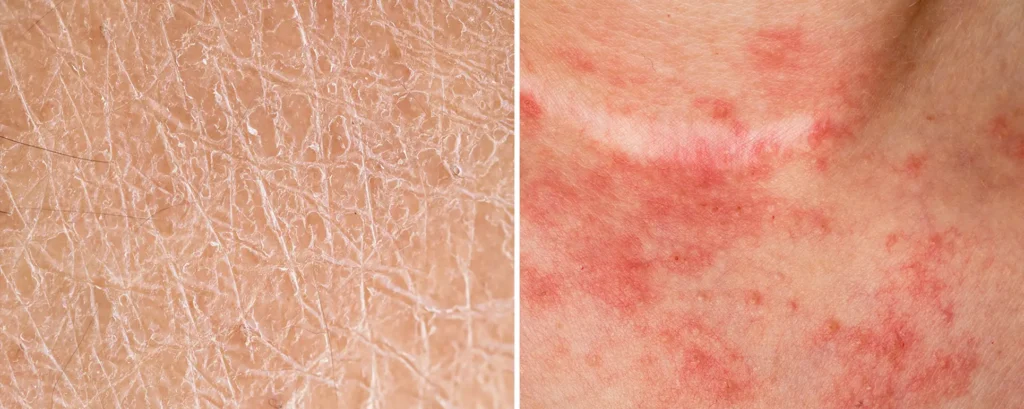Many people struggle to tell the difference between dry skin and eczema, as on the surface the two conditions can appear almost identical. Both can leave your skin feeling tight, rough, itchy, or flaky, and in more noticeable cases, you might even see redness, irritation, or small cracks forming. Because of this overlap, it is easy to assume they are the same thing. However, in reality, they are two very different conditions that require different approaches when it comes to care, prevention, and treatment. Understanding the distinctions can help you take better care of your skin and ensure that you are not ignoring something that may require medical attention.
Dry skin is one of the most common skin concerns, and in most cases, it is relatively minor and temporary. It tends to be linked to external and environmental factors that strip the skin of its natural oils and moisture. For example, cold weather, wind, central heating, and air conditioning can all contribute to a loss of hydration in the skin. Similarly, frequent hot showers, harsh cleansers, or soaps with strong fragrances can weaken the protective barrier, leaving skin more vulnerable to dryness and irritation. Even something as simple as not drinking enough water throughout the day can make the skin appear dull and lifeless. When the barrier is compromised, the skin often feels rough or tight, and it may even develop fine lines or peeling. Fortunately, in most situations, dry skin responds well to lifestyle changes and self-care. Using a good-quality moisturiser regularly, choosing gentle cleansers, avoiding over-washing, and staying well hydrated can restore the skin’s natural balance. Once the underlying triggers are reduced or eliminated, dry skin usually improves fairly quickly.
Eczema, however, is far more complex and cannot be managed in quite the same way. Unlike ordinary dryness, eczema is a chronic inflammatory skin condition that involves an overreaction of the immune system combined with a weakened skin barrier. This means that the skin not only loses moisture more easily but also becomes far more sensitive and reactive to everyday irritants. As a result, eczema often presents with symptoms that go beyond dryness, such as intense itching, redness, swelling, and thickened or leathery patches of skin. In more severe cases, cracks may form, and the skin may ooze or bleed, making the condition particularly uncomfortable and disruptive to daily life. Unlike dry skin, which usually clears up when conditions improve, eczema tends to follow a cyclical pattern, with flare-ups that can be triggered by stress, allergens, irritants, or even changes in diet. Many people with eczema also have a family history of allergies, asthma, or hay fever, which suggests a strong genetic component. Because of its chronic nature, eczema usually requires more specialised treatment, which may include prescription creams, barrier-repair therapies, or other medical interventions tailored to the individual.
Being able to distinguish between ordinary dry skin and eczema is crucial for effective management. Treating eczema as if it were just dryness can leave symptoms unresolved and, in some cases, may even make the condition worse over time if the skin is not properly supported. On the other hand, recognising the early signs of eczema means that steps can be taken sooner to control flare-ups, reduce discomfort, and minimise the impact on daily life. For those who are unsure whether their symptoms are related to simple dryness or something more persistent, seeking advice from an Eczema Clinic in London can provide clarity and reassurance. A specialist will be able to examine the skin, identify the underlying cause of the problem, and create a tailored treatment plan that addresses both the symptoms and the triggers, helping to restore comfort and long-term skin health.
1. How Dry Skin Differs from Eczema

Appearance
- Dry Skin: Dry skin typically has a uniform look across the affected area. It often appears dull, rough to the touch, and flaky, almost as if the skin is shedding fine white or grey scales. When severe, the skin may crack slightly, especially on the hands or heels, but it usually does not show dramatic redness. Dryness is often most noticeable in areas exposed to the environment, such as the face, legs, or arms, and can make the skin feel tight after washing. For many people, this condition is more of a cosmetic nuisance than a medical issue, although persistent dryness can still cause discomfort.
- Eczema: Eczema, however, produces more noticeable and varied changes to the skin’s appearance. Patches of eczema often look red, inflamed, and irritated, with visible borders separating them from the surrounding healthy skin. In some cases, the surface may develop scales, crusts, or even small fluid-filled blisters that can burst and ooze. Over time, areas of skin affected by repeated flare-ups can become thickened, leathery, or darker in colour (a process called lichenification). Unlike dry skin, which spreads fairly evenly, eczema usually shows up in specific areas commonly in skin folds like the elbows, knees, behind the ears, or around the eyes.
Itchiness
- Dry Skin: The itchiness that comes with dry skin is usually mild. You might notice a slight urge to scratch, particularly in the evening or after a shower, but it’s rarely overwhelming. Once a good moisturiser is applied, the skin often feels soothed and comfortable again. For most people, itch from dryness is occasional, not something that dominates daily life.
- Eczema: By contrast, eczema is notorious for its relentless itch. People with eczema often describe it as an “itch that you cannot ignore,” and scratching only intensifies the problem. This creates a damaging cycle itch leads to scratching, scratching damages the skin, and broken skin triggers more inflammation and itching. This constant irritation can interfere with sleep, concentration, and quality of life. In fact, dermatologists often consider the intensity of itching one of the clearest ways to distinguish eczema from simple dryness.
Triggers
- Dry Skin: Dry skin is primarily triggered by external conditions. Cold winter air, low humidity, and heated indoor environments are some of the most common culprits. Everyday habits, such as long hot baths, over-washing, or using strong cleansers, also strip away the skin’s protective oils. Even something as simple as frequent hand washing or alcohol-based sanitisers can quickly dry out the skin. The good news is that because the causes are usually environmental, symptoms tend to improve once these triggers are managed switching to a gentler cleanser, using a humidifier indoors, or moisturising more frequently can often solve the problem.
- Eczema: Eczema, on the other hand, is influenced by a combination of internal and external factors. Genetics play a strong role if you have a family history of eczema, asthma, or hay fever, your risk of developing it is higher. Environmental triggers such as dust mites, pollen, or pet dander can cause flare-ups, as can irritants like fragranced skincare, wool fabrics, or cleaning products. Stress and emotional strain are also powerful triggers, and for some people, certain foods may contribute as well. Unlike dry skin, eczema doesn’t always respond to simple moisturising and may require more structured management.
Duration and Pattern
- Dry Skin: In most cases, dry skin is short-lived and responds quickly to care. It may appear during colder months, after exposure to harsh conditions, or during times when the skin barrier is temporarily weakened. Once the skin is rehydrated with moisturisers and external irritants are avoided, the problem usually resolves. Many people experience seasonal cycles of dryness but do not have year-round symptoms.
- Eczema: Eczema is a chronic and recurring condition, which means it tends to persist long term and flare up repeatedly. Flare-ups may last days or even weeks, and they often require more than just moisturiser to calm down. Even when the skin clears, eczema can come back at any time, making it an ongoing challenge for those affected. Because of its recurring nature, eczema usually needs a tailored treatment plan, often including prescription creams, medicated ointments, or other therapies under medical supervision. Unlike simple dryness, which is largely an inconvenience, eczema can have a significant impact on both physical comfort and emotional wellbeing.
2. Self-Care vs Professional Treatment

Dry Skin Management
For most people, dry skin can be managed at home with consistent self-care. The goal is to restore the skin’s natural barrier and prevent further moisture loss. Simple changes in your daily routine often make a big difference:
- Use gentle cleansers: Swap harsh soaps and foaming washes for fragrance-free, soap-free cleansers that won’t strip your skin of natural oils. Cleansing should remove dirt and impurities without leaving your skin feeling tight or squeaky.
- Apply moisturiser regularly: The key to managing dryness is hydration. A thick, fragrance-free cream or ointment works better than a light lotion, as it locks moisture in for longer. Applying moisturiser immediately after bathing or washing your hands helps trap water in the skin.
- Avoid long, hot showers: Hot water may feel relaxing, but it can strip away protective oils from your skin. Instead, opt for short, lukewarm showers or baths, and gently pat your skin dry rather than rubbing it with a towel.
- Wear protective clothing in harsh weather: Cold winds and low humidity can worsen dryness, so wearing gloves, scarves, and protective layers helps reduce exposure. Indoors, using a humidifier can also prevent the air from drying out your skin further.
With these steps, most cases of dry skin improve within a few days to weeks. If managed consistently, dryness is usually a temporary issue rather than a long-term concern.
Eczema Management
Eczema is more complex and often needs more than just basic skincare. While moisturising is still important, flare-ups can be persistent and uncomfortable, making professional guidance essential.
- Seek expert evaluation: If eczema symptoms do not improve with home remedies or become severe, it’s important to book an appointment at an Eczema Clinic in London. Dermatologists can carefully assess the skin and confirm whether it is eczema or another condition that looks similar.
- Prescription treatments: Doctors may recommend topical corticosteroids, calcineurin inhibitors, or other medicated creams to reduce inflammation and control flare-ups. These treatments are tailored to the severity and location of your eczema.
- Trigger avoidance: Dermatologists can help identify your specific triggers, whether environmental, dietary, or stress-related, and guide you on how to minimise exposure. For example, switching detergents, avoiding certain fabrics, or adopting stress-management techniques may be part of your personalised plan.
- Tailored skincare routines: Unlike dry skin, which usually responds to a general moisturiser, eczema-prone skin benefits from a customised skincare plan. Dermatologists may recommend specific emollients, barrier creams, or even medicated washes to prevent future flare-ups.
Professional care becomes especially important if eczema begins to disrupt your daily routine whether it’s affecting your ability to sleep, concentrate, or feel comfortable in your own skin. Untreated eczema can lead to complications like skin infections or thickening of the skin, so getting timely help can make a big difference.
3. When to See a Dermatologist
Although many people manage occasional dry skin at home with moisturisers and simple lifestyle adjustments, there are times when professional care is not just helpful but essential. Leaving persistent symptoms untreated can lead to worsening irritation, skin damage, or even infections. Knowing when to seek medical advice can save you a great deal of discomfort and prevent the condition from interfering with your daily life.
Here are some clear situations where you should consider booking an appointment with a dermatologist:
- Redness and inflammation that persist despite home care: If your skin remains red, inflamed, or irritated even after using fragrance-free moisturisers and avoiding obvious triggers, this suggests that the problem may go beyond ordinary dryness. Prolonged redness is often a warning sign of eczema or another inflammatory skin condition that needs medical management rather than just self-care.
- Itching that is severe or disrupts sleep: Mild itchiness is common with dry skin, but when the itching becomes intense, relentless, or interrupts your sleep, it’s a strong indicator that something more serious is going on. With eczema, the itch can be so overwhelming that people find themselves scratching unconsciously during the night, leading to raw or broken skin by morning. This level of discomfort almost always requires professional intervention.
- Signs of infection: When scratching damages the skin barrier, bacteria can enter, resulting in infection. Warning signs include yellowish crusting, oozing, increased swelling, warmth, and pain in the affected area. Infections not only worsen discomfort but also require prescription treatment, such as topical or oral antibiotics. Ignoring these signs can allow the infection to spread and make the skin more difficult to heal.
- Uncertainty about whether it’s eczema or dry skin: Many people struggle to tell the difference, especially when symptoms overlap. For example, a patch of rough, flaky skin might simply be dryness, but if it starts spreading, thickening, or causing intense itching, it could actually be eczema. A dermatologist can carry out a proper examination, rule out other conditions like psoriasis or fungal infections, and give you a clear diagnosis.
- Symptoms affecting quality of life: Even if the skin isn’t infected, flare-ups that interfere with your work, social life, or confidence should not be dismissed. Living with constant itchiness, visible rashes, or uncomfortable dryness can take an emotional toll and is a valid reason to seek professional help.
At an Eczema Clinic in London, dermatologists have the expertise to distinguish between simple dryness and more complex conditions like eczema. They can recommend the most effective treatments, ranging from prescription creams and ointments to tailored skincare routines and advice on avoiding triggers. In some cases, they may also suggest additional therapies such as light treatment (phototherapy) or systemic medication for severe, widespread eczema.
Professional care is especially important for children, as eczema often begins in infancy or early childhood. A specialist can ensure that a child’s skin is managed safely, reducing the risk of long-term discomfort and helping parents feel confident in caring for their child’s condition.
Ultimately, seeing a dermatologist isn’t just about treating flare-ups it’s about getting the right guidance to protect your skin long term, restore its barrier function, and reduce the likelihood of recurring problems.
Final Thought: Knowing the Difference Matters
Dry skin and eczema can seem very similar at first glance, but understanding the differences is key to getting the right care. While dry skin is usually temporary and improves with simple self-care measures, eczema is a chronic condition that often needs specialist input. Recognising when it’s more than just dryness such as when symptoms are persistent, intensely itchy, or showing signs of infection can help you take timely action.
If you are unsure about your symptoms or find that they are interfering with your quality of life, it’s always best to seek expert guidance. You can get in touch to book a consultation at our eczema clinic in London, where dermatologists can provide an accurate diagnosis and create a tailored treatment plan to help restore your skin’s health and comfort.
References:
- Nemeth, V. (2024) Eczema, StatPearls. Available at: https://www.ncbi.nlm.nih.gov/books/NBK538209/
- Hellicar, L. (2022) ‘What is the difference between eczema and dry skin?’, Medical News Today, 29 September 2022. Available at: https://www.medicalnewstoday.com/articles/eczema-vs-dry-skin
- Afshari, M. (2024) ‘Unraveling the skin; a comprehensive review of atopic …’ Frontiers in Immunology. Available at: https://www.frontiersin.org/journals/immunology/articles/10.3389/fimmu.2024.1361005/full
- Finlay, A.Y. (1980) ‘The ‘dry’ non-eczematous skin associated with atopic eczema’, British Journal of Dermatology, 103(3), pp. 249–255. doi:10.XXXX/bjd1980. https://academic.oup.com/bjd/article-abstract/103/3/249/6670385
- Amin, R. (2023) ‘The prevalence and severity of dry skin and related …’, Journal of the American Academy of Dermatology, 2023. Available at: https://www.sciencedirect.com/science/article/pii/S0197457223002756
